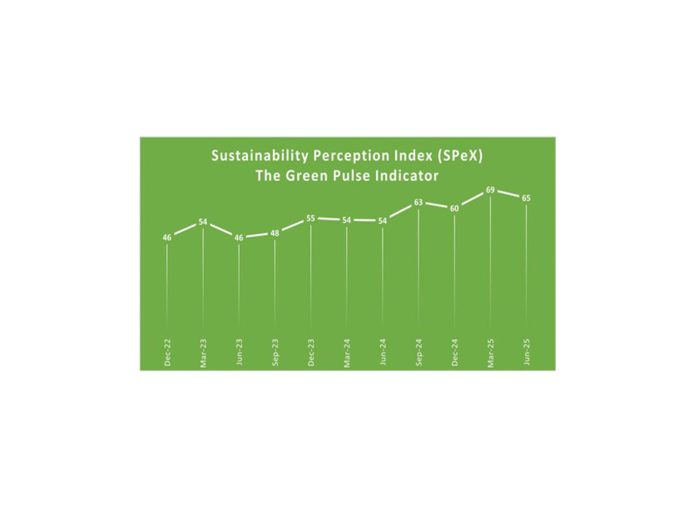Dun & Bradstreet, in collaboration with SIDBI, has released the Sustainability Perception Index (SPeX) for the period of April-June 2025, also referred to as the ‘Green Pulse Indicator.’ The index measures the perception of sustainability among Micro, Small, and Medium Enterprises (MSMEs) across three key dimensions: willingness, awareness, and implementation.
For Q2 2025, the SPeX index saw a notable 20% year-on-year increase, rising to 65, marking one of the highest levels in recent years. This uptick indicates a positive trend, even though there have been occasional quarterly fluctuations. While awareness and implementation have shown some moderation, the continued rise in willingness (+3%) signals a strong intent among MSMEs to act on sustainability, provided they receive the necessary support.
Dr. Arun Singh, Global Chief Economist at Dun & Bradstreet, commented, “MSMEs are steadily advancing on their sustainability journey, as reflected by the 20% year-on-year rise in the SPeX Index to 65 in Q2 2025. This marks one of the highest levels recorded in recent years. The trend shows that small and medium businesses are maturing in their approach to sustainability. Importantly, the willingness to act is on the rise, especially among younger enterprises that are integrating green practices into their brand and growth strategies. Medium-sized enterprises are leading the way in implementation, while sectors like capital goods are still in the data-gathering phase. Regulation and cost efficiency continue to drive action, with MSMEs prioritising environmental and governance goals. While Diversity, Equity, and Inclusion (DEI) remain a secondary focus, simplifying certification processes and expanding access to technical expertise will be crucial for converting intent into impact.”
Dr. Ravindra Kumar Singh, Chief General Manager at SIDBI’s Green Climate Finance Vertical, added, “The SIDBI-D&B Sustainability Perception Index (Green Pulse) for Q2 2025 reflects a growing commitment from MSMEs toward sustainability. The latest findings show that 66% of MSMEs plan to expand their environmental policies, and 76% anticipate profitability gains from these initiatives. MSMEs are increasingly focused on adopting clean and green technologies, while becoming more responsive to Environmental & Social (E&S) factors. SIDBI’s Green Schemes are addressing MSMEs’ capital needs by promoting energy efficiency, renewable energy, e-mobility, circular economy, and adaptation projects. Our GIFT & SPICE schemes, implemented through 25 lending partners, are creating momentum for green investments. To qualify as a Green Loan, projects must meet rigorous standards, ensuring energy savings and/or reductions in greenhouse gas emissions.”
Key Highlights from the SPeX Report (Q2 2025)
Overall Trends:
- The SPeX Index increased by 20% YoY to 65, reflecting a strengthening commitment to sustainability among MSMEs.
- 66% of MSMEs plan to expand their environmental policies, with 76% expecting profitability gains from sustainability measures.
- Profitability and cost reduction remain the strongest motivators for sustainability adoption, though uncertain returns and limited capital availability continue to hinder investments.
- Awareness of green financing has increased across all business segments, with younger and micro enterprises leading the way.
- Governance implementation has strengthened, particularly among micro and medium-sized firms.
- Integration of Environmental, Social, and Governance (ESG) factors is deepening, with better financial literacy and clearer policy communication facilitating broader adoption.
Awareness:
- Awareness of sustainability measures has slightly moderated, especially among small enterprises.
- Despite high awareness of green financing, policy literacy remains weak, with nearly half of young businesses (under 5 years) unaware of government support programs.
- Younger businesses (under 25 years) have increased green financing uptake by 14%, using it to position themselves as future-ready.
- Micro enterprises are adopting governance measures early (50% implementation), while medium enterprises lead implementation at 64.7%, with full adoption in six states.
- The capital goods sector remains in an early stage, focusing on data collection.
Willingness:
- Willingness to adopt sustainability practices rose by 3% QoQ, reflecting strong intent among MSMEs.
- Regulatory compliance (66%) and cost efficiency remain key drivers, particularly among businesses aged 1-10 years.
- Internal stakeholder influence remains limited in driving sustainability action.
- Full environmental implementation has been achieved in 13 out of 21 states, with Kerala and Madhya Pradesh leading the way.
- Social sustainability measures are gaining traction, with 73% of small and 75% of medium businesses actively implementing social parameters.
- Micro and medium firms are leading the formalization of sustainability policies, with 53% of medium and 60% of micro enterprises strengthening governance commitments.
Implementation:
- Significant progress in building sustainability capabilities: 60% of MSMEs have developed expertise in sustainable strategies, up from 13% in Q4 2024.
- Medium-sized firms are leading circular economy practices, with 65% implementing “reduce-reuse-recycle” measures, up from 31% in Q1 2025.
- Among younger firms (1-5 years), 53% report full compliance with sustainability policies.
- Key barriers to implementation include lack of capital availability (65%) and uncertain returns (63% for firms aged 5-10 years).
- Kerala and Madhya Pradesh have achieved full environmental implementation among micro and medium firms.
- States like Kerala (90%), Telangana (88%), and Chhattisgarh (84%) show high sustainability familiarity, while Maharashtra lags behind with only 50% medium industry awareness.
Methodology:
The SPeX Index ranges from 0 to 100 and tracks the evolving perception of sustainability among MSMEs, measuring changes across three dimensions:
- Awareness: Understanding of sustainability measures and policy support.
- Willingness: Intent and motivation to adopt sustainability practices.
- Implementation: Execution of sustainability actions.
An increase in the SPeX value reflects growing perceptions and adoption momentum, while a decline signals emerging challenges or weakening sentiment.















